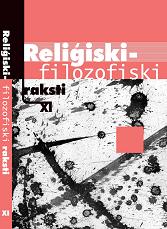Kārļa Skalbes reliģija un ētika
Religion and ethics of Kārlis Skalbe: (2) Ethics of Kārlis Skalbe (the ending)
Author(s): Alberts FreijsSubject(s): Philosophy
Published by: Latvijas Universitātes Filozofijas un socioloģijas institūts
Summary/Abstract: This issue presents the second (the ending) part of the manuscript by the Latvian theologian Alberts Freijs (1903-1968) devoted to ethical views of the famous Latvian writer and litterateur Kārlis Skalbe (1879-1945). The author analyzing K. Skalbe’s poems, fairy-tales, stories, and journalism finds in them notions that for the writer are often used and are raised to the level of philosophically ethical categories: human being and humanity, personal freedom, modesty in the positive and negative sense, renouncement, purity of heart, loneliness, silence, simplemindedness, humility, kindheartedness, poverty, pain and joy, love, friendship, work, home, woman and mother, not remembering evil and expiation and others. A. Freijs reveals K. Skalbe as one of the most excellent knowers of the subtle vibrations of the human soul and the fact that K. Skalbe being the lyricist of sorrow doesn’t disappear in the world of pain and sadness. He always rises up to life; he is not a pessimist because he sees that the life ever revives itself, that death has no absolute power – the doesn’t perish.
Journal: Religiski-filozofiski raksti
- Issue Year: XI/2007
- Issue No: 1
- Page Range: 9-57
- Page Count: 49
- Language: Latvian

